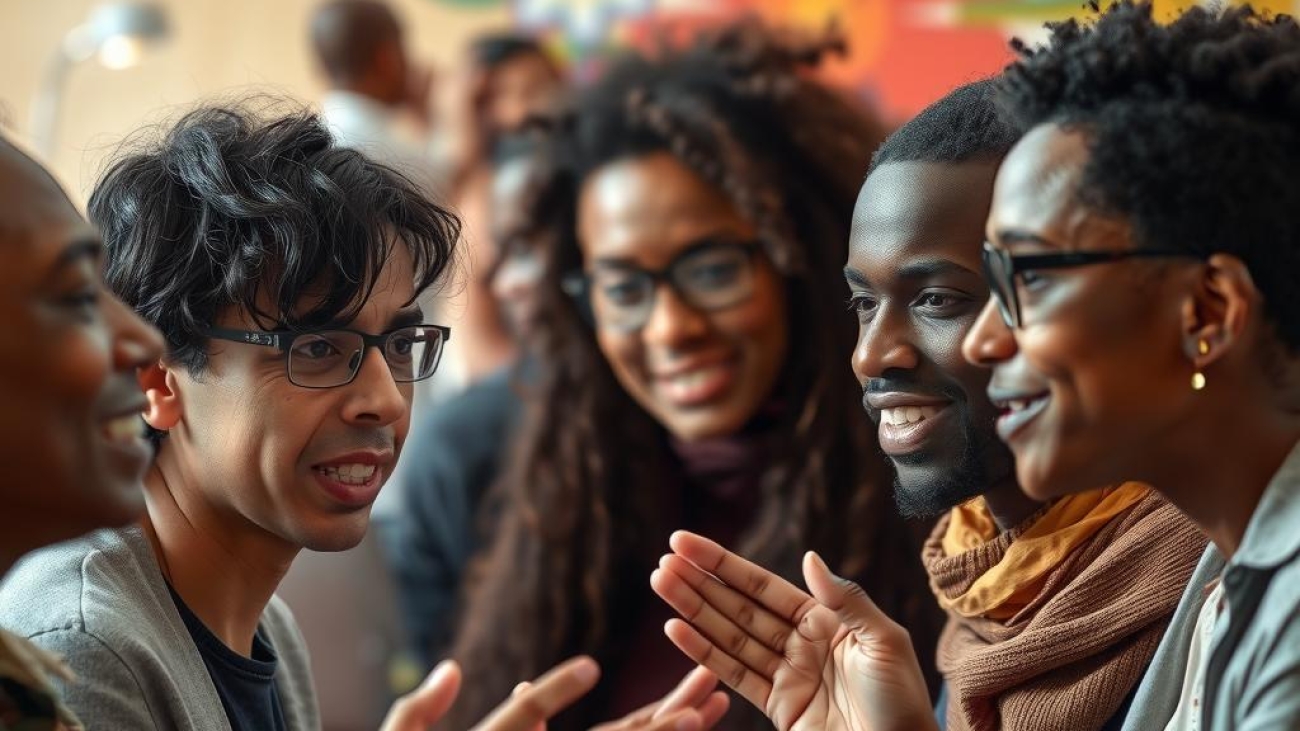In an increasingly complex world, the importance of emotional intelligence cannot be overstated. As individuals navigate their personal and professional lives, the ability to understand and manage emotions plays a critical role in fostering healthy interpersonal relationships and enhancing overall well-being. This is where The Art of Emotional Intelligence comes into play—offering valuable insights into the intricate dynamics of human interaction. By mastering emotional skills training, individuals can learn to harness their emotional awareness effectively, leading to improved communication and deeper connections with others.
At its core, emotional intelligence encompasses several vital components: self-awareness, empathy development, emotional regulation exercises, and relationship enhancement techniques. These elements work synergistically to create a solid foundation for self-improvement techniques that facilitate personal growth. For instance, through enhanced self-awareness, individuals become more attuned to their own feelings as well as those of others around them. This heightened sensitivity allows them not only to respond appropriately but also to connect on a more profound level—a crucial aspect of forming lasting bonds.
Moreover, The Art of Emotional Intelligence emphasizes the significance of empathy in building trust within relationships. Empathy enables one to step into another’s shoes and understand their perspectives or emotions genuinely; thus serving as a cornerstone for effective communication and collaboration. When people engage in active listening—an essential skill promoted by this approach—they foster an environment conducive to open dialogue where issues can be addressed constructively.
Furthermore, mastering various emotional regulation exercises equips individuals with tools necessary for managing stressors that may arise during challenging interactions or conflicts. Rather than reacting impulsively out of frustration or anger, emotionally intelligent persons can pause momentarily before responding thoughtfully—a practice that often leads toward resolution rather than escalation.
By incorporating concepts from The Art of Emotional Intelligence, readers are encouraged not just towards individual improvement but also collective harmony within social circles—from friendships at home all the way up through workplace dynamics—all while promoting effective strategies tailored specifically for fostering robust connections among diverse populations across multiple contexts. Through nurturing these competencies over time—not just theoretically but practically—the pathway opens up toward richer experiences both personally and professionally alike.

Key Points:
-
Title of the key point: Understanding Emotional Intelligence
A comprehensive exploration of emotional intelligence reveals its critical components and their significance in both personal growth and interpersonal relationships. The product, The Art of Emotional Intelligence, emphasizes how mastering these elements can lead to enhanced self-awareness and improved connections with others. By gaining insight into one’s own emotions as well as those of others, individuals are better equipped to navigate social situations effectively. -
Title of the key point: Exercises for Self-Awareness
To cultivate stronger emotional skills, The Art of Emotional Intelligence provides a variety of practical exercises aimed at boosting self-awareness. These activities encourage individuals to reflect on their feelings, thoughts, and behaviors in different scenarios. Through consistent practice using these self-improvement techniques, users can develop greater empathy and enhance their ability to regulate emotions—key aspects that contribute significantly to relationship enhancement. -
Title of the key point: Empathy Development Techniques
Empathy is a cornerstone of emotional intelligence that greatly influences interpersonal dynamics. In The Art of Emotional Intelligence, readers will find targeted strategies for cultivating empathy through active listening and perspective-taking exercises. These methods not only facilitate deeper connections but also support effective communication within relationships. By engaging in such emotional regulation exercises, individuals learn how to respond more compassionately during interactions, ultimately enriching their personal growth journey.

The Essence of Emotional Intelligence
Unlocking Personal Growth Through Self-Awareness
The concept of emotional intelligence has gained significant attention in recent years, particularly as individuals seek pathways to enhance their personal growth. Central to this understanding is the foundational component of self-awareness, which refers to the ability to recognize and understand one’s own emotions and how they influence thoughts and behavior. This self-reflective process allows individuals not only to assess their emotional responses but also facilitates a deeper connection with others, paving the way for improved interpersonal relationships. By engaging with resources like The Art of Emotional Intelligence, readers can explore various techniques that promote self-improvement, including mindfulness practices aimed at enhancing self-perception. Developing such insights encourages individuals to identify triggers that provoke strong emotional reactions, ultimately leading them toward healthier responses.
Building Empathy: A Cornerstone for Connection
Another critical aspect of emotional intelligence is empathy development, which involves recognizing and understanding the feelings of others. Cultivating empathy enhances one’s capability to relate authentically within social contexts, fostering stronger connections in both professional and personal spheres. Techniques highlighted in The Art of Emotional Intelligence, such as active listening exercises or perspective-taking activities, allow practitioners to cultivate a nuanced appreciation for diverse viewpoints. Individuals who engage deeply with these skills often find themselves better equipped for relationship enhancement—navigating conflicts more effectively while cultivating an atmosphere where compassion thrives. As empathy builds trust among peers or family members, it lays down a solid foundation upon which meaningful interactions can flourish.
Mastering Emotional Regulation
Emotional regulation is another vital domain within the framework of emotional intelligence. It encompasses strategies designed to manage one’s emotional state proactively rather than reactively responding when faced with challenges or stressors. Through targeted practices found in resources like The Art of Emotional Intelligence, individuals learn essential self-improvement techniques that facilitate healthier coping mechanisms during turbulent times. These may include journaling about one’s feelings or practicing breathing exercises designed specifically for emotional calming—an approach that can significantly impact daily functioning by reducing anxiety levels and promoting resilience against overwhelming situations.
Enhancing Relationships through Skills Training
Furthermore, developing robust emotional skills training programs enables participants not only to enrich their own lives but also positively affect those around them through enhanced communication capabilities and conflict resolution strategies. Engaging with materials from The Art of Emotional Intelligence, learners are encouraged toward proactive dialogue approaches wherein they express emotions constructively instead of allowing misunderstandings or resentment festers unchecked over time—ultimately serving as catalysts for profound relational transformations across various interaction platforms from workplaces altogether up into familial bonds where harmony reigns supreme due diligence towards continuous improvement remains steadfastly propagated throughout everyday dealings amongst society’s interconnected fabric!

The Essence of Self-Awareness
Cultivating a Deeper Understanding of Oneself
Self-awareness serves as the cornerstone of personal development, guiding individuals on their journey toward unlocking their inner potential. By engaging in exercises that enhance self-awareness, one can gain invaluable insights into thoughts, emotions, and behaviors. This heightened understanding not only fosters emotional intelligence but also equips individuals with the tools necessary for effective interpersonal relationships. Techniques such as reflective journaling or mindfulness meditation encourage deeper contemplation about one’s reactions and feelings in various situations. When an individual takes the time to reflect on daily experiences, they begin to identify patterns that may either hinder or promote their growth. Such practices are essential components found within The Art of Emotional Intelligence, which emphasizes the importance of recognizing one’s emotional triggers and responses as foundational elements for self-improvement techniques.
Enhancing Empathy Through Self-Reflection
Building Stronger Connections with Others
Empathy development is intricately linked to self-awareness; thus enhancing one’s capacity for empathy begins with introspective practices. Engaging in emotional regulation exercises helps individuals understand their own feelings before attempting to comprehend those of others. For instance, when practicing active listening during conversations, one must first be aware of personal biases and emotions that could cloud judgment or impede connection. Exercises like role-playing scenarios where perspectives shift can significantly enhance this skill set by allowing individuals to step outside themselves momentarily. Moreover, resources such as The Art of Emotional Intelligence offer strategies tailored towards improving empathetic responses through structured activities aimed at fostering greater awareness around others’ emotional landscapes while simultaneously addressing one’s own needs.
The Pathway to Personal Growth
Unlocking Potential Through Intentional Practices
Personal growth thrives at the intersection of self-awareness and actionable steps taken towards improvement. Individuals who regularly engage in relationship enhancement practices often find themselves better equipped for navigating complex social dynamics effectively due to increased clarity regarding both internal states and external influences on behavior. Implementing regular check-ins—where one evaluates progress against personal goals—encourages accountability while fostering a culture of continual reflection; this is vital for sustaining long-term development. Additionally, The Art of Emotional Intelligence provides comprehensive guidance on setting realistic objectives based on increased levels of awareness achieved through ongoing training in emotional skills training. By integrating these methodologies into everyday life routines, individuals reinforce positive change while concurrently cultivating resilience against challenges encountered along their developmental path.
The Power of Empathy in Relationships
Understanding the Role of Empathy in Personal Connections
Empathy serves as a cornerstone for building strong interpersonal relationships, acting as a bridge that connects individuals on deeper emotional levels. Through empathy development, people can enhance their capacity to perceive and resonate with the emotions of others, which is crucial for fostering meaningful interactions. In today’s fast-paced world, where digital communication often overshadows face-to-face encounters, cultivating emotional intelligence becomes essential in nurturing these connections. The Art of Emotional Intelligence emphasizes how self-awareness plays a pivotal role in this process; those who understand their own feelings are better equipped to recognize and respond to the emotions of others effectively.
Moreover, enhancing one’s empathetic abilities entails engaging in various activities designed to promote emotional regulation exercises. These practices not only improve one’s ability to manage personal feelings but also create an environment conducive to relationship enhancement. For instance, active listening—an integral component of empathy—encourages individuals to fully engage with what another person is expressing without immediately jumping to conclusions or offering solutions. This approach fosters trust and creates space for vulnerability within relationships.
Additionally, incorporating self-improvement techniques from resources like The Art of Emotional Intelligence allows individuals to develop essential emotional skills training necessary for navigating complex social dynamics. As one becomes more adept at understanding different perspectives through empathy development, they find themselves becoming more compassionate and tolerant toward others’ experiences and viewpoints. This shift not only strengthens existing bonds but can also pave the way for new connections based on mutual respect and understanding.
Research shows that when individuals practice empathy intentionally within their daily lives—be it through volunteering or simply extending kindness—they contribute positively not only to their own well-being but also enrich their communities significantly. The cultivation of such traits leads directly into personal growth; heightened levels of self-awareness, along with refined interpersonal skills fostered by regular practice, create a ripple effect that enhances overall quality of life.
In conclusion, embracing empathy as an actionable skill transforms how people interact with each other fundamentally while promoting healthier social networks filled with support and understanding. By utilizing tools found in resources like The Art of Emotional Intelligence, anyone can embark on this transformative journey towards stronger connections built upon compassion and shared experiences—a testament that genuine human connection thrives when guided by empathy.
Understanding Emotional Regulation
The Key to Balanced Reactions
Emotional regulation is a crucial aspect of maintaining balanced responses in everyday situations. It involves the ability to manage one’s emotional state and respond appropriately, rather than reacting impulsively. This skill is essential for fostering healthy interpersonal relationships and facilitating personal growth. Engaging with resources like The Art of Emotional Intelligence can significantly enhance one’s capacity for self-awareness, allowing individuals to recognize their emotional triggers and patterns. For instance, practicing techniques such as deep breathing or mindfulness can help pause an immediate reaction, providing the space needed to assess a situation more rationally. By developing these skills through consistent practice, individuals not only improve their own emotional well-being but also contribute positively to their social environment.
Techniques for Effective Emotional Management
Building Skills Through Practice
Mastering effective techniques for managing emotions leads directly to improved interactions within various contexts of life—be it at work or home. Implementing emotional regulation exercises allows individuals to better understand how emotions impact their decision-making processes. Tools provided in The Art of Emotional Intelligence, such as journaling feelings or engaging in empathetic dialogues with others, encourage reflection on one’s thoughts and behaviors. These self-improvement techniques are fundamental in reducing anxiety during conflict situations by promoting clarity of thought before responding emotionally. Furthermore, training oneself in empathy development lays the groundwork for stronger connections with others; understanding different perspectives fosters a supportive environment where open communication flourishes.
Enhancing Relationships Through Emotion Control
Creating Harmonious Interactions
Effective management of emotions not only benefits individual mental health but also enhances overall relationship dynamics. When individuals practice emotional regulation consistently, they cultivate healthier exchanges that are less prone to misunderstandings or conflicts that arise from unchecked reactions. Resources like The Art of Emotional Intelligence emphasize this connection by providing insights into how increased emotional intelligence directly correlates with successful interpersonal engagements. By learning about non-verbal cues and active listening through targeted emotional skills training sessions, individuals become adept at navigating complex social landscapes while maintaining composure under pressure. These competencies foster an atmosphere conducive to collaborative problem-solving and mutual respect—key ingredients for enduring relationships that thrive on trust and understanding.
Practical Strategies for Enhancing Emotional Intelligence
Cultivating Self-Awareness Through Daily Practices
Self-awareness serves as the cornerstone of emotional intelligence, enabling individuals to recognize their emotions and understand how these feelings influence thoughts and behaviors. By integrating practical exercises into daily routines, one can enhance this crucial skill significantly. For instance, keeping a daily journal is an effective method for promoting self-reflection; by documenting emotional responses to various situations, individuals can identify patterns in their behavior and thought processes over time. According to The Art of Emotional Intelligence, journaling not only fosters introspection but also encourages a deeper understanding of oneself—allowing for greater clarity in personal motivations and emotional triggers. Additionally, engaging in mindfulness meditation each morning is another powerful technique that promotes self-awareness; it helps clear mental clutter and allows for the observation of thoughts without immediate judgment or reaction. This practice enhances one’s ability to regulate emotions effectively throughout the day.
Developing Empathy through Real-Life Applications
Building Stronger Interpersonal Relationships
Empathy plays a vital role in interpersonal relationships, acting as a bridge between individual experiences and collective understanding. To cultivate empathy on a daily basis, one might engage in active listening exercises during conversations with friends or colleagues. Rather than simply waiting for their turn to speak, individuals are encouraged to fully absorb what others are saying—acknowledging feelings expressed—and responding thoughtfully. As highlighted in The Art of Emotional Intelligence, practicing empathetic communication not only strengthens connections but also fosters an environment where open dialogue thrives, thereby enhancing overall relationship quality. Another effective strategy involves volunteering or participating in community service projects; such experiences expose individuals to diverse perspectives while simultaneously enriching their capacity for compassion towards others’ struggles. By actively placing themselves within different social contexts, they develop an enriched sense of empathy that informs both personal growth and relationship enhancement.
Mastering Emotional Regulation Techniques
Implementing Change with Consistent Exercises
Emotional regulation is essential for navigating life’s challenges successfully while maintaining healthy interactions with others. One practical exercise detailed in The Art of Emotional Intelligence suggests implementing breathing techniques whenever faced with stressful situations: taking deep breaths can help ground emotions before reacting impulsively or negatively impacting relationships due to unchecked feelings. Furthermore, creating personalized coping strategies tailored specifically toward triggering scenarios can significantly improve emotional responses over time—a process referred to as self-improvement techniques within the realm of emotional skills training. For example, if someone identifies that public speaking induces anxiety leading them away from engaging opportunities at work or school environments—they might rehearse speeches alone initially before progressing toward smaller audience settings gradually until comfort levels increase substantially over time through exposure therapy principles applied regularly alongside supportive feedback mechanisms provided by trusted peers or mentors after utilizing these approaches collectively results ultimately reflects enhanced confidence levels along with superior emotional management capabilities contributing positively toward organizational success!
The exploration of emotional intelligence is critical for those seeking to transform their relationships and enhance self-awareness. The Art of Emotional Intelligence serves as a comprehensive guide that delves deep into the core components of emotional intelligence. By understanding these elements, individuals can embark on a journey of personal growth, significantly improving their interpersonal relationships. The emphasis on empathy development allows readers to cultivate deeper connections with others, fostering an environment where communication thrives.
Furthermore, The Art of Emotional Intelligence offers practical exercises aimed at enhancing self-awareness and promoting effective emotional regulation. These techniques not only assist in recognizing one’s own emotional states but also encourage individuals to manage their reactions in various situations. Through engaging in these emotional regulation exercises, readers can learn how to control impulsive responses, leading to more thoughtful interactions and stronger bonds with others.
In addition to the foundational knowledge provided within The Art of Emotional Intelligence, the book presents numerous strategies for relationship enhancement through improved interpersonal skills. Readers will discover insightful methods for practicing active listening and demonstrating genuine empathy towards others’ feelings. These self-improvement techniques are essential for anyone looking to bolster their emotional skills training and enrich both personal and professional relationships.
Common Inquiries:
Q: What are the key components of emotional intelligence?
A: The key components include self-awareness, self-regulation, motivation, empathy, and social skills which together contribute to enhanced interpersonal relationships.
Q: How can I improve my self-awareness?
A: Self-awareness can be improved through reflective practices such as journaling about emotions or engaging in mindfulness activities that help recognize one’s feelings without judgment.
Q: Are there specific exercises for developing empathy?
A: Yes, many exercises focus on perspective-taking or active listening techniques that allow individuals to better understand others’ emotions and experiences effectively.

Add a Comment